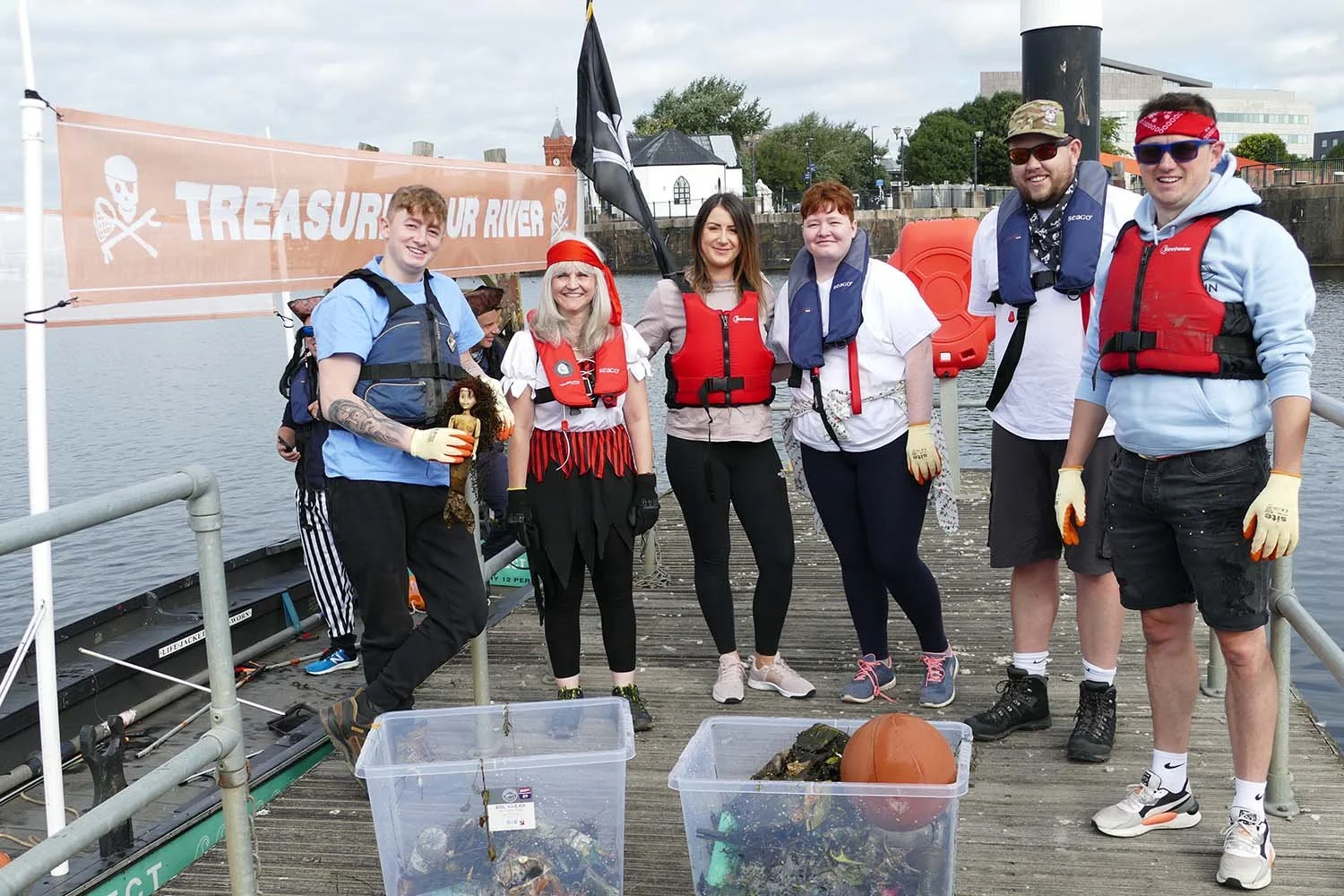Treasure Your River
A buccaneering campaign to combat river litter
Ahoy me hearties, 75% of people in the UK wish they could do more to tackle marine litter (Hubbub, 2020). Our buccaneering #TreasureYourRiver campaign used the power of pirate-themed events to recruit clean-up crews and encourage people to keep their rivers in ship-shape.
We collaborated with litter-busting organisations around the UK to bring litter-clearing activities to six major UK rivers. Clean-ups and engagement events took place along:
Campaign activities took place along the following rivers:
Mersey River System – Salford, Manchester & some activities in Liverpool.
Thames and Lea – London.
Avon – Bristol.
Taff & Cardiff Bay – Cardiff.
Trent and feeder Canals– Nottingham.
Forth – Edinburgh, Stirling.
Other activities along the Severn.
What’s the sitch? Let’s zoom in on the issue
1. Most of it comes from land.
Each year, more than 8 million tonnes of plastic is dumped in the sea (the equivalent of 2.2 million orcas and 11.7 million pirate ships). 80% of the litter in our oceans comes from land through rivers and waterways.
2. Rivers carry litter to sea.
UK rivers contribute to the problem by ferrying litter towards the seven seas. The River Thames alone has an estimated 300 tonnes of litter making its way out to sea each year.
3. Microplastics are a macro problem.
In addition, all rivers tested in the UK contain high amounts of microplastics, in some locations this was even higher than in the Great Pacific Garbage Patch.
4. It's harmful and costly.
Any litter that doesn’t sail out to sea can get stuck in tidal river systems; meaning it can accumulate, harm wildlife and be costly to clean up.
What our crew got up to
Along each of the rivers, a range of litter busting activities took place to engage local residents and businesses, including:
Litter Picks
Typical litter picks turned into pirate fancy dress, scavenger hunts and silent disco events to encourage new people to join clean-ups. We took to the waves with remote-controlled boats that picked up litter floating on the surface. Our Plastic Fishing boats also toured the UK, encouraging volunteers to join the crew and hunt for plastic with their trusty litter picks.
Plastic fishing
‘Plastic Fishing boats’ are made from 99% recycled plastic and set sail in Bristol, Cardiff, London, Manchester, and canals near Edinburgh.
Volunteers climbed aboard to collect litter in each of the locations to get a first-hand look at the issue of litter and to help clear waterways.
Sorting of litter could easily be carried out in the boat, acting as a great talking point and opportunity to engage people in citizen science.
Art installations
To further bring the issue of litter to life, we worked with artist Michelle Reader to create visually engaging installations made out of litter from the local area and recycled materials.
The installations were created through workshops inviting school groups and members of the public along to help make their mark on the installation and inspire others to think twice about dropping litter.
“Working with Michelle to make sculptures from plastic recovered from the environment with the local adventure playground was a great success and allowed us to work with low income children and their families in a fun and engaging way.
The sculptures were mostly made in a local park used by the community and provided us the opportunity to speak to lots of people in the community about the river.
The clean-ups were a wonderful opportunity for the children and leaders of the playground, local residents themselves, to learn about how to access the river on their doorstep and opened their eyes to the possibilities of using it as an open space.” - Thames21
Robot boats
Remote controlled, litter collecting robot boats were trialled for the first time in the UK as part of a litter campaign.
The boats were donated to Hubbub by IKEA Greenwich. Hubbub worked with a design studio, ‘3D Studios’, to create the pirate boat shell from items salvaged from the Thames foreshore.
The robot boats were striking and eye catching. They provided a great conversation starter for members of the public and encouraged others to get involved. However, they were also heavy and difficult to manoeuvre, and faced some technical issues, so if this were to be repeated, we’d take a slightly different approach.
Litter pick boards
To increase access to litter picking equipment we offered business and community groups a litter pick board from the 2-minute foundation. These boards contain litter pickers, reusable bags, and hand sanitiser to encourage passersbys to do a quick litter pick.
Images of the campaign in action.
What difference did we make?
The campaign was independently measured by the Rivers Trust.
Over 82 Treasure Your River clean-up events took place, and more than 1,217 bags of litter were prevented from entering our rivers or plundered from our waterways.
Over 924 people joined the crew at a clean-up event, committing more than 3,455 volunteer hours.
Of those who took part in an activity:
88% said they learn something new about plastic pollution
9 out of every 10 respondents felt motivated to take more action to reduce their plastic consumption illustrating the power of engagement events to help catalyse behaviour change.
From the litter surveys the results were collated and analysed:
Want to join the crew, matey?
Take our ‘What Pirate Are You’ quiz to get some tailored tips to become a top-tier river advocate.
Be a rebel – if you see litter on the ground, rebel against the status quo and pick up that treasure.



